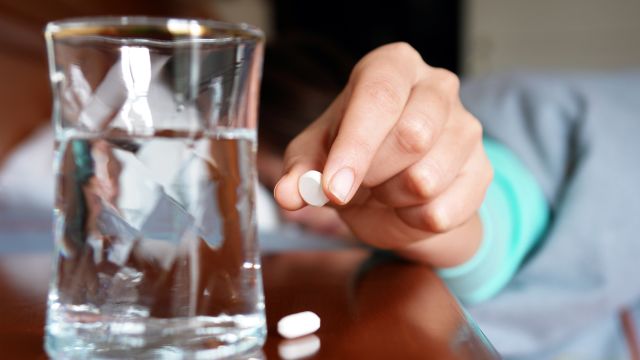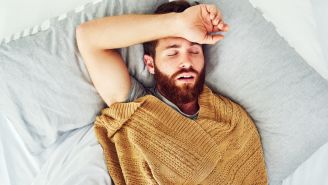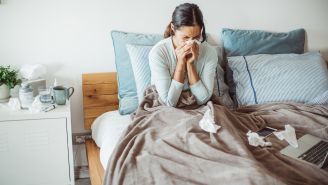Updated on December 22, 2021.
If you consistently have trouble falling asleep—and who doesn’t?—you’ve probably heard about melatonin. Melatonin is, in fact, the most commonly used supplement for sleep, with nearly 4 million Americans using it, according to some estimates.
But does melatonin reliably and effectively send you off to dreamland? If so, how much should you take and when should you take it? And what is melatonin, exactly?
Melatonin, explained
To understand what melatonin is and how it works, it first helps to describe how we sleep.
Sleep is regulated by our body’s exposure to light or darkness. Melatonin is a natural hormone produced in the pineal gland, a tiny organ deep inside the brain. During the day, your pineal gland is inactive, but it begins secreting melatonin when darkness falls. Once this happens, your melatonin levels typically stay elevated for about 12 hours. As melatonin is released into your bloodstream, you become sleepy.
Once the night is over and your body is exposed to daylight, melatonin levels drop, your body temperature rises, and cortisol (a stimulating hormone) is secreted. Given that melatonin production begins when your surroundings begin to darken, it’s not surprising that bright and artificial lighting prevents its release, thereby interfering with your sleep.
While melatonin is a hormone your body naturally produces, it's one of the few hormones you can buy without a prescription. It’s important to remember, though, that dietary supplements aren’t regulated by the U.S. Food and Drug Administration (FDA) and the potential downside is that many products provide inaccurate dosage information on their packaging.
The actual melatonin content of some melatonin products, for example, can range widely from what’s listed on the label, according to a study published in 2017 in the Journal of Clinical Sleep Medicine. The melatonin content of the same brand may also vary from bottle to bottle.
So, should you take melatonin?
Most experts believe that it’s better to avoid taking any type of sleep medication if possible.
“We try to get people to sleep better without medication treatment, and at least two-thirds of the time, we’re able to do that,” says Keith Roach, MD, associate professor in clinical medicine in the division of general medicine at Weill Cornell Medical College and New York Presbyterian Hospital. “It’s shocking how often people aren’t doing everything they need to.”
So, before experimenting with supplements, make an appointment with your healthcare provider (HCP) to talk about your sleep problems. Your HCP will seek to find out whether you may have an underlying sleep disorder such as restless legs syndrome, obstructive sleep apnea, or narcolepsy. They will also likely screen you for any other medical causes that may be contributing to your difficulties. Early morning waking, for example, could be a sign of major depression, Dr. Roach notes.
If it seems that your everyday habits may be the main reason behind your sleep problems, your HCP may recommend you try making tweaks to your sleep routine. Things to try include the following:
- Power down your electronic devices and other sources of light two hours before bedtime. If you do use devices in the evening, try using blue-light blocking glasses or screen shields to cut down on stimulating blue light.
- Get out of bed if you’re unable to sleep. “You don’t want your bed associated in your mind as a place where you just lie there and get frustrated,” says Roach. If you can’t fall asleep within 20 minutes, go to another room and listen to quiet music, read with a dim light, or practice some breathing techniques. Return to bed when you feel sleepy.
- Stick to a consistent sleep and wake schedule, even on the weekends.
- Set your bedroom temperature at a cool range between 60 and 70 degrees.
- Avoid daytime naps and only use your bed for sleeping.
- Steer clear of alcohol, cigarettes, and heavy meals beginning at least two hours before bedtime, and avoid caffeine at least six hours before going to sleep.
- Don’t exercise too close to bedtime. It’s best to work out four or more hours beforehand.
- Do things in the evening that can help you relax, like taking a hot bath or having a cup of chamomile tea.
- If noise interferes with your slip, consider using a white noise machine or ear plugs.
What to keep in mind if you do take melatonin
If you’re practicing healthy sleep habits but you’re still having trouble getting quality rest, your HCP may suggest that you try melatonin.
“Melatonin is relatively safe and it doesn’t cause the kinds of problems that over-the-counter or prescription medications do, which is why it may be worth a try for some people,” says Roach.
But there are some things you should consider about melatonin before you head to the store:
The timing and dosage of melatonin matters most. If melatonin is going to help you, you need to take the right dosage at the right time. If you take too much at the wrong time, you could be sleepy during the day and wide awake at night.
Roach says age plays a role in how much and when you should take melatonin.
“For younger adults in their 20s, 30s, and even into their 40s, taking it mid-afternoon is normally most effective, and half a milligram should be plenty,” he says. “But older people may be able to take a slightly larger dose—one milligram—an hour or so before bedtime.”
Talk to your HCP about the dosage that’s right for you and check labels carefully before buying to make you know how much you’re getting. According to a 2014 study published in Nutrition Journal, melatonin dosages of 1 to 10 milligrams can raise your body’s melatonin levels from 3 to 60 times their normal peak levels.
Its effectiveness depends on your symptoms. Melatonin is more likely to work for people who wake up very early in the morning, which could indicate a circadian rhythm problem, or for those who aren’t able to fall asleep right away, says Roach. “For those who wake up after an hour or two of sleep, it’s probably not effective,” he adds.
It’s a short-term fix. Your HCP is probably going to recommend melatonin for short-term use only. Some experts advise that melatonin should be taken for a few months, tops.
If you’ve been taking melatonin for three months and not sleeping better, Roach says it’s probably not working so you should stop and talk to your HCP. In that case, you may have a more serious underlying sleep condition that would require different treatment.
Some people shouldn’t take melatonin. Although melatonin is generally seen as safer than other sleep medications, including over-the-counter options like diphenhydramine, Roach says there are some circumstances that may dissuade your HCP from recommending it. These may include:
- You’ve had a bad reaction to melatonin in the past.
- You’re taking other prescription sleep medication.
- You’re pregnant or breastfeeding.
- You have health conditions such as autoimmune disorders, diabetes, depression, or high blood pressure.
The bottom line on melatonin
All in all, there appear to be no major safety concerns about melatonin, but more research is needed to fully understand it’s effectiveness and safety profile. It’s important to recognize that just because a supplement is “natural” does not always mean it’s safe for all people. It’s always best to see your HCP before you start taking a supplement like melatonin, especially if you’re doing all you can to practice healthy sleep habits but aren’t seeing positive results.
Your HCP can screen you for underlying conditions that may be causing your sleep troubles. And if you do decide to try melatonin, your HCP can advise you on the dosage that may work best for you.







